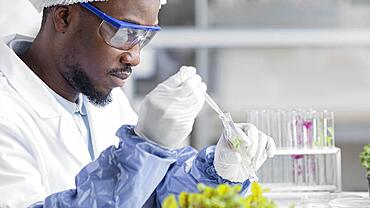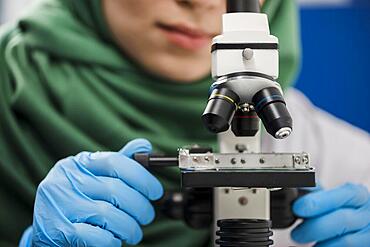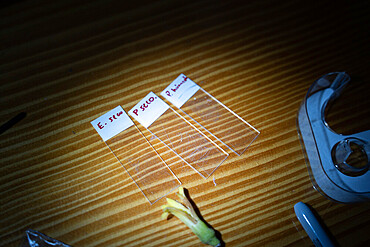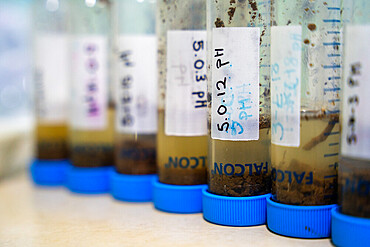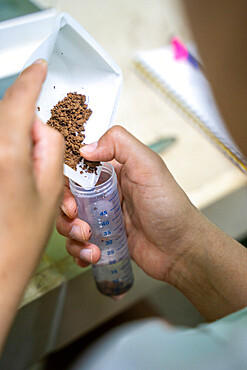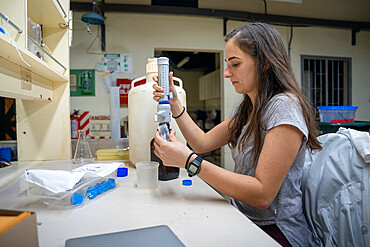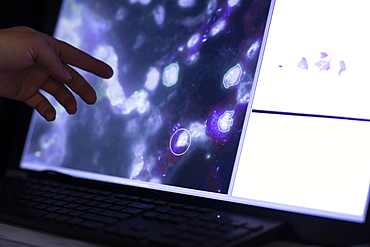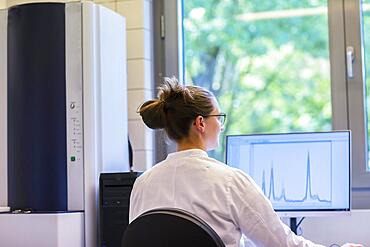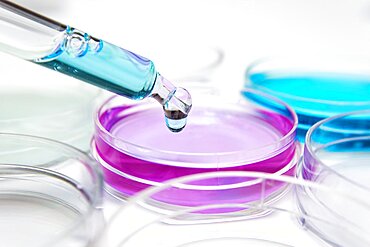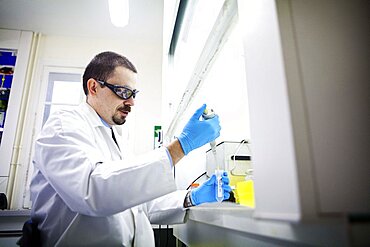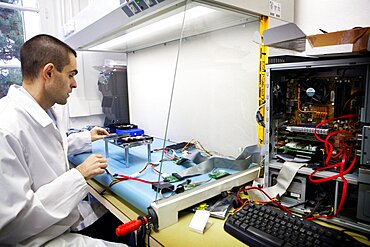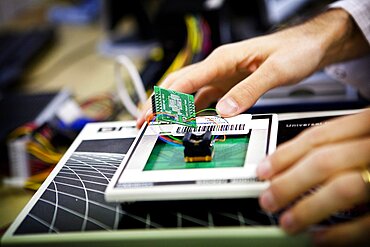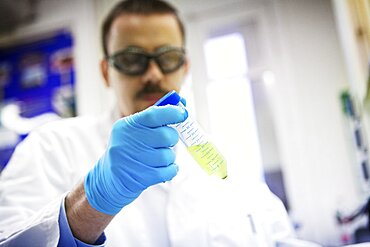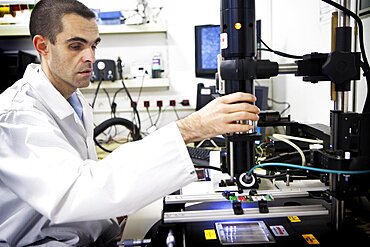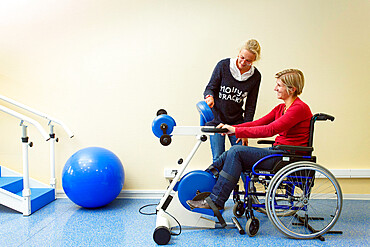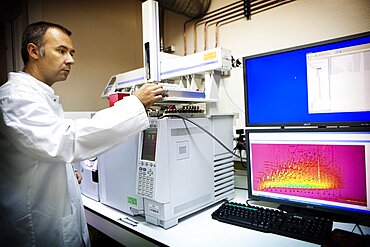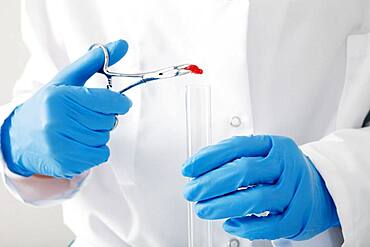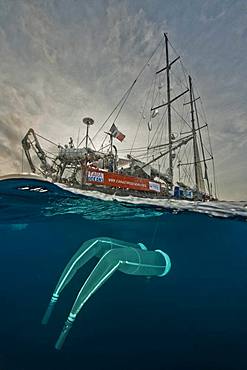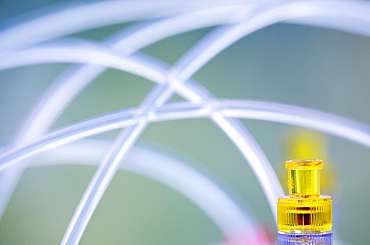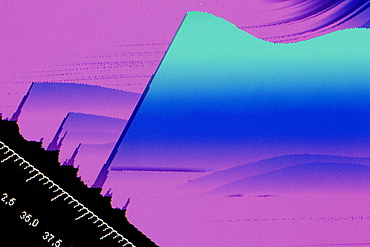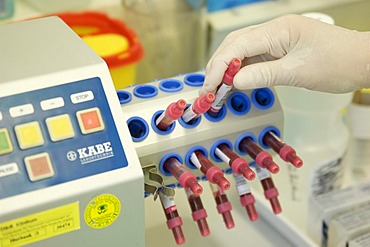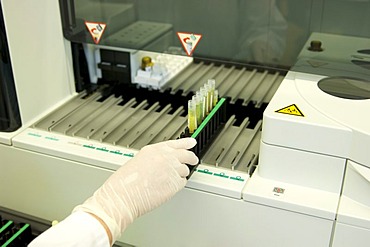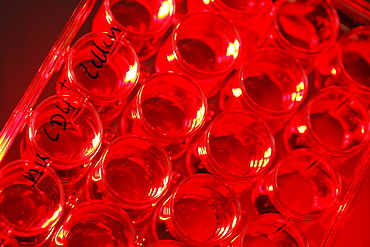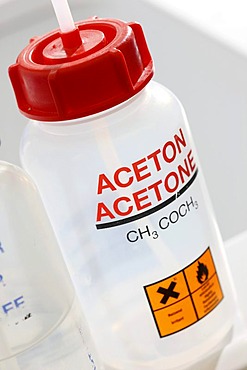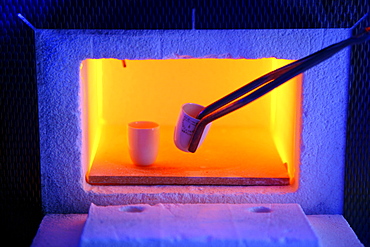Recent searches
Loading...
832-403677 - Side view researcher biotechnology laboratory with plant test tube
832-403667 - Female scientist with hijab working lab with microscope
832-403807 - Female scientist with hijab microscope laboratory
860-291429 - 3 microscope slides to analyze pollen transported on bat hairs, "La Selva" research station in Puerto Viejo de Sarapiqui, Costa Rica
860-291422 - Earth diluted with water in order to extract the PH from the soil as part of a study on nitrogen exchanges between bacteria and the roots of legumes in the tropical forest of the "La Selva" research station in Puerto Viejo from Sarapiqui, Costa Rica
860-291420 - Earth diluted with water in order to extract the PH from the soil as part of a study on nitrogen exchanges between bacteria and the roots of legumes in the tropical forest of the "La Selva" research station in Puerto Viejo from Sarapiqui, Costa Rica
860-291419 - 27-year-old researcher working in a lab on nitrogen exchange between bacteria and the roots of legumes in the rainforest at the "La Selva" research station in Puerto Viejo de Sarapiqui, Costa Rica
832-398521 - Female doctor vaccinating her colleague
1350-6424 - Mature scientist male in his 50s wearing a lab coat looking through a microscope in a laboratory. Basque Country, Spain, Europe.
832-394934 - Sample evaluation on the monitor in a histology laboratory, Freiburg, Baden- Wuerttemberg, Germany, Europe
832-394394 - Laboratory evaluation in a laboratory for the control of hazardous substances, Freiburg, Baden-Wuerttemberg, Germany, Europe
832-394385 - Laboratory examination with laboratory apparatus and monitor, evaluation of a laboratory examination with chemist in the laboratory, Freiburg, Baden-Wuerttemberg, Germany, Europe
832-394392 - Fish preparation for laboratory evaluation in a food control laboratory with laboratory assistant, Freiburg, Baden-Wuerttemberg, Germany, Europe
832-394393 - Fish for laboratory evaluation in a laboratory for the control of food with laboratory assistant, Freiburg, Baden-Wuerttemberg, Germany, Europe
1348-5556 - Pipette with drop of color liquid and petri dishes.
1348-3928 - Clinical research in the GHICL. The physical medicine and rehabilitation department in Saint Philibert hospital in Lille, France. Exercises to develop the patient's muscle tone in functional rehabilitation, under the supervision of a doctor.
860-287450 - Tara Oceans Expeditions - May 2011. Tara with deployed plancton nets. On "station", the boat is drifting without engine or sails. Tara Oceans, a unique expedition: Tara Oceans is the very first attempt to make a global study of marine plankton, a form of sea life that includes organisms as small as viruses and bacterias, and as big as medusas. Our goal is to better understand planktonic ecosystems by exploring the countless species, learning about interactions among them and with their environment. Marine plankton is the only ecosystem that is almost continuous over the surface of the Earth. Studying plankton is like taking the pulse of our planet. Recently, scientists have discovered the great importance of plankton for the climate: populations of plankton are affected very rapidly by variations in climate. But in turn they can influence the climate by modifying the absorption of carbon. In a context of rapid physico-chemical changes, for example the acidification observed today in the world's oceans, it is urgent to understand and predict the evolution of these particular ecosystems. Finally, plankton is an astonishing way of going back in time ? a prime source of fossils. Over the eons, plankton has created several hundred meters of sediment on the ocean floors. This allows us to go back in time, to the first oceans on Earth, and better understand the history of our biosphere. More than 12 fields of research are involved in the project, which will bring together an international team of oceanographers, ecologists, biologists, geneticists, and physicists from prestigious laboratories headed by Eric Karsenti of the European Molecular Biology Laboratory. Galapagos
832-333962 - Testing vials for the identification of the ingredients, quality assurance of a company producing natural remedies and cosmetics, Basel, Switzerland, Europe
832-333958 - Detail and tubes of a HPLC for the analysis of liquids, quality assurance in a company producing natural cosmetics, Arlesheim, Switzerland, Europe
832-333961 - Three dimensional depiction of a computer graphic for the identification of parts of a solution of a homeopathic remedy, quality assurance in a company producing natural cosmetics, Arlesheim, Switzerland, Europe
832-324463 - Hand in a sterile glove placing a tube of blood in a mixer in a laboratory
832-324456 - Hand in a sterile glove placing trays in a large piece of clinical equipment in a laboratory
832-319680 - Laboratory of the Criminal Investigation Department, CID, for DNA analysis, scene-of-crime evidence, analysis and comparison of DNA samples of suspects, Duesseldorf, North Rhine-Westphalia, Germany, Europe
832-314156 - DEU, Germany, Duesseldorf: Police NRW, Federal Police, technical crime investigation service. DNA analysis laboratory. |
832-314153 - DEU, Germany, Duesseldorf: Police NRW, Federal Police, technical crime investigation service. DNA analysis laboratory. |
832-314179 - Bio technology in a bio laboratory, analysis of chemical an biological processes, analysis of DNS and molecules, conditioning for researches and eperiments, conditioning of cell cultures, Germany
832-314180 - Bio technology in a bio laboratory, analysis of chemical an biological processes, analysis of DNS and molecules, conditioning for researches and eperiments, conditioning of cell cultures, Germany
832-314155 - DEU, Germany, Duesseldorf: Police NRW, Federal Police, technical crime investigation service. DNA analysis laboratory. |
832-145296 - Acetone, Centre for Medical Biotechnology at the University of Duisburg-Essen, North Rhine-Westphalia, Germany, Europe
832-145291 - Small glass jar, Centre for Medical Biotechnology at the University of Duisburg-Essen, North Rhine-Westphalia, Germany, Europe
832-42809 - High-temperature furnace, with temperatures of up to 1000∞ C, where samples are melted for laboratory tests, to analyze them later
987-43 - science: soil scientist examining structure. dundee, scotl and
817-115157 - The Howard Hospital Laboratory staff are busy and use fairly modern lab equipment, This day the department is waiting for a Swedish donation of a new chemical analyzer, The Howard Hospital is a Salvation Army facily based at Concession, Zimbabwe
817-67371 - Sediments and ecotoxicology laboratories, Sediments tests (sludge, mud), filtering and drying, AZTI-Tecnalia, Technological Centre specialised in Marine and Food Research, Pasaia, Gipuzkoa, Euskadi, Spain.
817-67497 - Bacteries count, Microbiology Laboratory, Microbiological analysis of food, AZTI-Tecnalia, Technological Centre specialised in Marine and Food Research, Sukarrieta, Bizkaia, Euskadi, Spain.
817-115165 - Billy Ndawana, left, medical lab scientist, and Benefit Munjeri, Lab Head, on November 30, 2006 use a Selecta Junior chemical analyzer at the Howard Hospital in Zimbabwe, The Selecta is a recent donation from the Whitby (Ontario) Rotary Club
817-67479 - Sensor Laboratory, Sensor analysis, Meat products taste, AZTI-Tecnalia, Technological Centre specialised in Marine and Food Research, Sukarrieta, Bizkaia, Euskadi, Spain.
817-67368 - Sediments and ecotoxicology laboratories, Sediments tests (sludge, mud), filtering and drying, AZTI-Tecnalia, Technological Centre specialised in Marine and Food Research, Pasaia, Gipuzkoa, Euskadi, Spain.
817-67395 - Physics and chemistry laboratory, Tests for polluting agents in wine, AZTI-Tecnalia, Technological Centre specialised in Marine and Food Research, Sukarrieta, Bizkaia, Euskadi, Spain.
817-67512 - Pilot plant, Experimenting with liquid nitrogen in food, Whipped cream, Laboratories, AZTI-Tecnalia, Technological Centre specialised in Marine and Food Research, Sukarrieta, Bizkaia, Euskadi, Spain.
817-67505 - Studying textures in food (Dairy products) Rheology, R+D Laboratory, AZTI-Tecnalia, Technological Centre specialised in Marine and Food Research, Sukarrieta, Bizkaia, Euskadi, Spain.
817-67498 - Bacteries count, Microbiology Laboratory, Microbiological analysis of food, AZTI-Tecnalia, Technological Centre specialised in Marine and Food Research, Sukarrieta, Bizkaia, Euskadi, Spain.
817-67508 - Studying textures in food (Dairy products) Rheology, R+D Laboratory, AZTI-Tecnalia, Technological Centre specialised in Marine and Food Research, Sukarrieta, Bizkaia, Euskadi, Spain.
817-67511 - Pilot plant, Experimenting with liquid nitrogen in food, Whipped cream, Laboratories, AZTI-Tecnalia, Technological Centre specialised in Marine and Food Research, Sukarrieta, Bizkaia, Euskadi, Spain.
817-67390 - Physics and chemistry laboratory, Tests for polluting agents in wine, AZTI-Tecnalia, Technological Centre specialised in Marine and Food Research, Sukarrieta, Bizkaia, Euskadi, Spain.
817-67397 - Physics and chemistry laboratory, Tests for polluting agents in wine, AZTI-Tecnalia, Technological Centre specialised in Marine and Food Research, Sukarrieta, Bizkaia, Euskadi, Spain.
817-67381 - Chemistry laboratory, Water tests, AZTI-Tecnalia, Technological Centre specialised in Marine and Food Research, Pasaia, Gipuzkoa, Euskadi, Spain.
817-67369 - Sediments and ecotoxicology laboratories, Sediments tests (sludge, mud), filtering and drying, AZTI-Tecnalia, Technological Centre specialised in Marine and Food Research, Pasaia, Gipuzkoa, Euskadi, Spain.
817-67392 - Physics and chemistry laboratory, Tests for polluting agents in wine, AZTI-Tecnalia, Technological Centre specialised in Marine and Food Research, Sukarrieta, Bizkaia, Euskadi, Spain.
817-67529 - Microbiology laboratory, Light pulses technology for food preservation (fishing products), Microbiological analysis, AZTI-Tecnalia, Technological Centre specialised in Marine and Food Research, Sukarrieta, Bizkaia, Euskadi, Spain.
817-67463 - Sensor Laboratory, Sensor analysis, Meat products taste, AZTI-Tecnalia, Technological Centre specialised in Marine and Food Research, Sukarrieta, Bizkaia, Euskadi, Spain.
817-67473 - Sensor Laboratory, Sensor analysis, Meat products taste, AZTI-Tecnalia, Technological Centre specialised in Marine and Food Research, Sukarrieta, Bizkaia, Euskadi, Spain.
817-67379 - Chemistry laboratory, Water tests, AZTI-Tecnalia, Technological Centre specialised in Marine and Food Research, Pasaia, Gipuzkoa, Euskadi, Spain.
817-67481 - Sensor Laboratory, Sensor analysis, Meat products taste, AZTI-Tecnalia, Technological Centre specialised in Marine and Food Research, Sukarrieta, Bizkaia, Euskadi, Spain.
817-67488 - Molecular Biology Laboratory, Preparing samples to detect the addition of tangerine to orange juice with DNA techniques, AZTI-Tecnalia, Technological Centre specialised in Marine and Food Research, Sukarrieta, Bizkaia, Euskadi, Spain.
